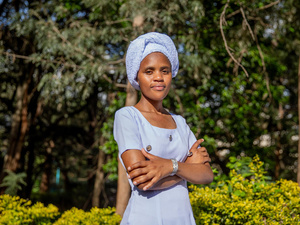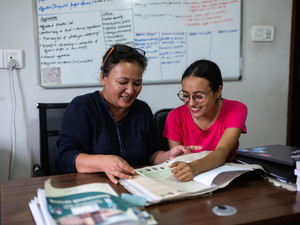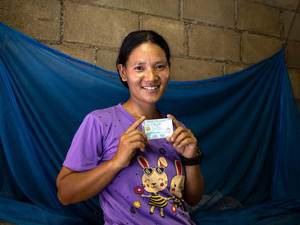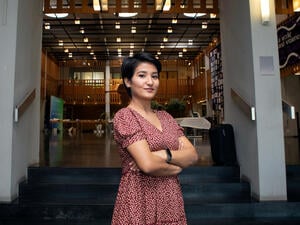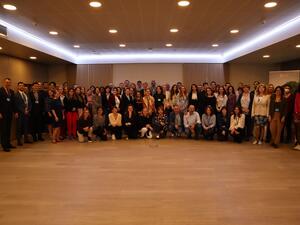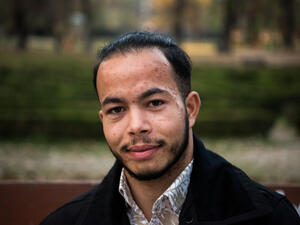Slovenian authorities turned legal resident into asylum seeker
Slovenian authorities turned legal resident into asylum seeker
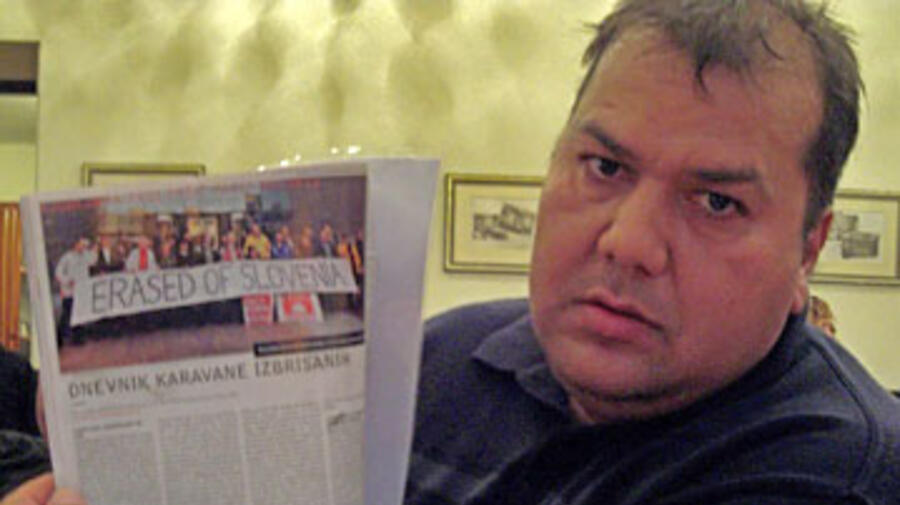
Alija Berisha holds up a newspaper article about people who were erased from Slovenia's register of legal residents. He is fighting a legal battle to be allowed to live in Slovenia.
LJUBLJANA, Slovenia, January 16 (UNHCR) - Alija Berisha is puzzled and angry. "Why do I have to ask for asylum in my own country? I have a right to live in Slovenia with my family," the ethnic Kosovan Roma tells a UNHCR visitor.
Berisha is a victim of the break-up of Yugoslavia, one of thousands of people left in limbo when Slovenia became independent in 1991. UNHCR has been lobbying for a solution for years and has repeatedly raised Berisha's case with the authorities.
"Avoiding statelessness is part of our mandate. The situation of the so-called erased in Slovenia clearly creates a legal limbo for a substantial group of people, and that should be resolved as quickly as possible," says Michael Lindenbauer, UNHCR's Budapest-based deputy regional representative, referring to thousands of people removed from Slovenia's residency registry in the 1990s.
Life used to be much simpler for Berisha, who first migrated to Slovenia from his native Kosovo in 1986 when he was 15 years old. Both places formed part of the Yugoslav federation at the time. But Slovenia declared independence 15 years ago, while Kosovo is nominally a province of Serbia.
Berisha joined a large electrical engineering firm in the north-east city of Maribor and was climbing up the company ladder when Yugoslavia started disintegrating in the early 1990s. Possessing a Slovenian ID card and paying taxes to the government, he did not feel threatened and continued to use his Yugoslav passport to visit his ailing mother in Kosovo.
But things started to go wrong when he went to visit a relative in Germany for a few days in 1993. He was arrested on his return, charged with illegal residence and locked up in a detention centre.
To his bewilderment, Berisha was deported to Albania - a country he had never been to. In court papers backing his appeal to remain in Slovenia, Berisha charged that his Slovenian papers were confiscated before he boarded the plane to Tirana and said he was refused permission to call relatives or his employer.
He also alleged that a police officer told him that Slovenia was for pure Slovenes and they did not want his type living in the country.
The Slovenian government denies his allegations and maintains that he is an illegal immigrant.
The Albanian authorities sent him back to Slovenia, where he was locked up again before managing to flee to Germany. "I was desperate. I did not want to end up in detention again for nothing," he recalls.
A German judge granted him temporary permission to stay in the country in 1995 and he found a job in the southern German town of Stuttgart, got married and started a family. But the court ruling ran out in June last year and Berisha had no choice but to agree to voluntary repatriation to Kosovo. The German authorities arranged for him to return to Kosovo via Slovenia, where Berisha's brother - a Slovenian citizen - had hired a lawyer to fight his case.
Berisha has been staying in asylum centres with his wife and five children since arriving back here in September 2005, while former Slovenian Constitutional Court judge Matevz Krivic argues his case in court. He has had some victories and Berisha's case is getting a lot of local media coverage and public support.
"We managed to avert deportation twice by administrative court decisions," says Krivic. Berisha and his lawyer are fighting on several fronts: restoration of permanent residence status in Slovenia; basic asylum protection; and dismissal of a pending deportation order to Germany.
He is one of the so-called "erased cases." When Slovenia become independent it offered citizenship to habitual residents who were originally from other Yugoslav republics - some 170,000 people successfully applied, but thousands more failed to follow the correct procedures and were removed from the residence registry.
A UNHCR study in 1997 put the number of stateless people in Slovenia at between 5,000 and 10,000. The refugee agency has helped to win recognition for some cases, but others - like Berisha - remain in limbo.
"UNHCR continues to bring up Berisha's and similar cases with the authorities," notes the refugee agency's Lindenbauer, while the lawyer, Krivic, says: "I am quite optimistic that the case will be resolved."
But the long-drawn out battle has taken its toll on Berisha. "All I want is to work and fend for my family," he says with a sigh.
By Melita H. Sunjic in Ljubljana, Slovenia

